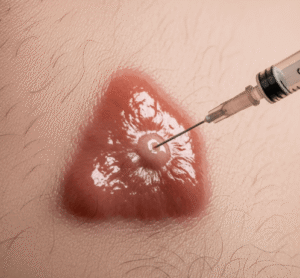Overview
Paranoia is a mental health condition characterized by persistent, irrational mistrust or suspicion of others. Individuals experiencing paranoia often believe that others intend to harm, deceive, or exploit them, even in the absence of evidence. Paranoia can vary from mild, occasional feelings of mistrust to severe, chronic delusions that interfere with daily life, relationships, and work.
In Korea, paranoia is assessed and treated by psychiatrists, psychologists, and mental health professionals, often as part of a broader evaluation for anxiety disorders, schizophrenia, or other psychiatric conditions. Early recognition and treatment improve functioning, safety, and quality of life.
Key Facts
➤ Paranoia involves unfounded suspicion or distrust of others.
➤ Can be a symptom of psychiatric disorders, such as schizophrenia, delusional disorder, or bipolar disorder.
➤ Often results in social withdrawal, anxiety, and hypervigilance.
➤ Severity ranges from mild mistrust to full-blown delusional beliefs.
➤ In Korea, mental health awareness and accessible psychiatric care facilitate early diagnosis and treatment.
What is Paranoia?
Paranoia is a psychological state where a person misinterprets benign actions or events as threatening.
➔ Characteristics include:
- Constant vigilance and difficulty relaxing around others.
- Misinterpretation of others’ intentions as harmful or conspiratorial.
- Overanalyzing events for hidden meanings or threats.
- Resistance to reassurance, even from trusted individuals.
Paranoia can manifest as:
- Suspicious thoughts – believing colleagues or family members are plotting against them.
- Delusional paranoia – strong, unshakeable beliefs of persecution or harm.
- Social paranoia – fear of judgment, ridicule, or exposure.
Symptoms Related to Paranoia
➤ Persistent suspicion of others’ motives.
➤ Difficulty trusting friends, family, or coworkers.
➤ Social withdrawal or isolation to avoid perceived threats.
➤ Heightened alertness or hypervigilance.
➤ Irritability, anxiety, or aggression when challenged.
➤ Difficulty concentrating or making decisions due to constant mistrust.
Causes / Possible Causes
Psychiatric Disorders
➤ Schizophrenia – paranoid subtype often includes delusions of persecution.
➤ Delusional disorder – persistent false beliefs of being targeted.
➤ Bipolar disorder – paranoia may occur during manic or depressive episodes.
Medical and Neurological Causes
➤ Dementia or Alzheimer’s disease – paranoia can appear in cognitive decline.
➤ Brain injury or stroke – particularly affecting the frontal lobe or limbic system.
➤ Chronic medical conditions – severe illness or medications may trigger paranoid thoughts.
Environmental and Psychological Factors
➤ Trauma or abuse history – increases susceptibility to mistrust.
➤ Chronic stress or social isolation – can exacerbate paranoid thinking.
➤ Substance use – drugs like stimulants, cannabis, or alcohol may provoke paranoia.
Risk Factors
➤ Family history of psychiatric disorders, including schizophrenia or paranoia.
➤ History of trauma or abuse in childhood or adulthood.
➤ Chronic stress, sleep deprivation, or social isolation.
➤ Substance use that affects brain chemistry.
➤ Older age when paranoia is linked to cognitive decline.
Complications
Untreated paranoia may lead to:
➤ Severe social isolation and relationship problems.
➤ Impaired functioning at work or school.
➤ Increased risk of aggressive or defensive behavior.
➤ Exacerbation of underlying psychiatric or medical conditions.
➤ Reduced quality of life and increased risk of depression or anxiety.
When Should I See My Doctor?
Seek professional help if:
➤ Paranoia interferes with daily life, relationships, or work.
➤ Thoughts of suspicion are persistent, irrational, or distressing.
➤ There is co-occurring aggression, depression, or self-harm risk.
➤ Symptoms worsen over time or appear suddenly.
➤ There is a history of trauma or psychiatric illness requiring evaluation.
Care and Treatment
Lifestyle and Home Measures
➤ Stress management – mindfulness, meditation, and relaxation techniques.
➤ Maintain social connections while setting healthy boundaries.
➤ Sleep hygiene – adequate rest reduces irritability and mistrust.
➤ Avoid substance use that may exacerbate paranoia.
Medical Treatments
➤ Psychotherapy – cognitive-behavioral therapy (CBT) to challenge irrational thoughts.
➤ Medication – antipsychotics, anxiolytics, or mood stabilizers depending on the cause.
➤ Treatment of coexisting conditions – depression, anxiety, or substance use disorders.
➤ Support groups or counseling – promote coping strategies and social support.
Preventive Measures
➤ Early intervention for stress, anxiety, or psychiatric symptoms.
➤ Education on healthy coping strategies for managing mistrust.
➤ Regular mental health check-ups for those at risk.
➤ Family involvement in monitoring and supporting treatment adherence.
Treatment Options in Korea
Korean mental health facilities provide comprehensive care for paranoia, including:
Diagnostic Services
➤ Psychiatric evaluation – assessing severity, triggers, and coexisting disorders.
➤ Psychological testing – to identify cognitive distortions and delusional thinking.
➤ Medical screening – to rule out neurological or metabolic causes.
Therapies and Supportive Care
➤ Cognitive-behavioral therapy (CBT) – addressing irrational beliefs and improving coping.
➤ Medication management – antipsychotics, anxiolytics, or mood stabilizers.
➤ Family counseling and psychoeducation – supporting treatment adherence.
➤ Multidisciplinary care – psychiatrists, psychologists, and social workers collaborating.
➤ Community support programs – promoting social integration and stress reduction.
✅ In summary: Paranoia is characterized by persistent, irrational suspicion of others, often associated with psychiatric or neurological conditions. In Korea, early diagnosis, psychotherapy, medication, and supportive care help manage symptoms, reduce distress, and improve overall functioning and quality of life.













